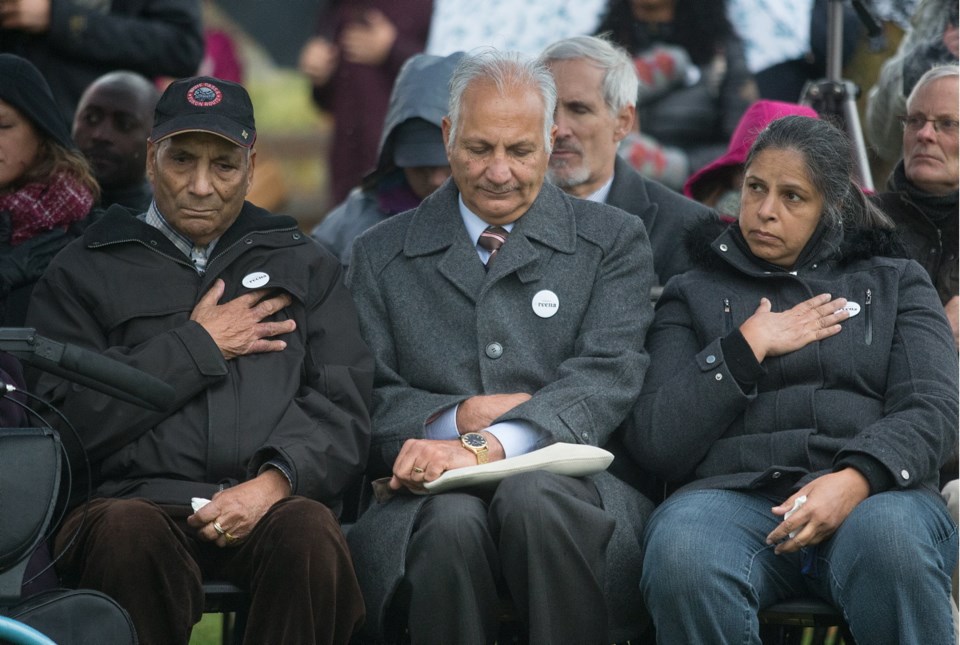Hundreds gathered steps away from the Craigflower Bridge, where 14-year-old Reena Virk was swarmed, beaten and drowned 20 years ago, to mark the anniversary of her murder on Tuesday.
As rain poured down, Reena’s father, Manjit Virk, said he was grateful to a community that ensured the family was never alone in its grief.
Twenty years ago, the family struggled to understand what had happened to Reena and why.
“I didn’t see any light on the other side of the tunnel. Everything was dark and our family just devastated,” Virk said outside the Craigflower Schoolhouse, where the memorial took place.
Now, reflecting on the anti-bullying programs inspired by Reena’s death, Virk said he’s filled with hope “that things have changed and her death has not been in vain.”
Reena was looking for acceptance and belonging when she got involved with a group of high school students her parents feared were a bad influence.
On Nov. 14, 1997, she was invited to a party under the Craigflower Bridge. A group of mostly teen girls beat Reena and burned her with cigarettes. As she limped across the bridge after the attack, she was followed by Warren Glowatski and Kelly Ellard. The two continued the assault, and then drowned Reena by holding her head under water.
Saanich police Staff Sgt. Chris Horsley was involved in the search for Reena’s body, which was found in the Gorge waterway eight days after her death.
The discovery launched a murder investigation, made difficult by rumour, speculation and a culture of secrecy among teens who didn’t want to be seen as snitches.
“To believe that young ladies just 14 years old could commit a crime like this was a shock, not just to the community, but to us as a police organization. It really was a turning point for the Saanich police,” Horsley said after Tuesday’s ceremony.
“It was hard to believe, but there were young girls who wouldn’t speak to the police and wouldn’t co-operate.”
Reena’s death gripped the entire nation, said Education Minister Rob Fleming.
“As the details, grisly as they were, emerged, it was a story of violence in our school system that had the most tragic consequences that anyone can imagine,” he told the crowd.
Fleming said Manjit and Suman Virk, who have travelled the country speaking to students about the dangers of bullying, helped to confront bullying and violence in the school system.
“They turned their own private tragedy into a public campaign to ensure other people’s children would not endure what Reena endured,” he said.
While some progress has been made, Kaylee Mennie, a 17-year-old student at Artemis Place, an alternative school for young women and transgender youth, said bullying is still a major problem for teens.
“There’s still threats, there’s still cyberbullying, there’s still violence, there’s still suicides that happen,” she said.
Mennie said Reena died because there was no one there to stand up for her.
“And still, nobody stands up about anything because they’re scared,” she said.
Inside the Craigflower Schoolhouse, people were encouraged to take photos holding a sign reading “I commit to non-violence” with the aim of spreading the message across social media. Poster boards were set up with photos of Reena as a young child.
“Reena’s story is not her death,” said Rachel Calder, executive director of the Artemis Place Society, which organized the event along with Learning Through Loss, an organization that helps youth deal with grief.
Rather, she said, it is in the art projects, books, research, legislative changes and school programs created in her name.
Sitting next to Manjit Virk at the ceremony were Reena’s grandparents, aunt and sister.
Her mother, Suman, was not well enough to attend.
Virk said that while the family misses Reena every day, they take comfort in the number of lives she has touched.
“In a way, [Reena’s] life was sacrificed, but look at the result — so many thousands have been saved, hopefully,” he said.



